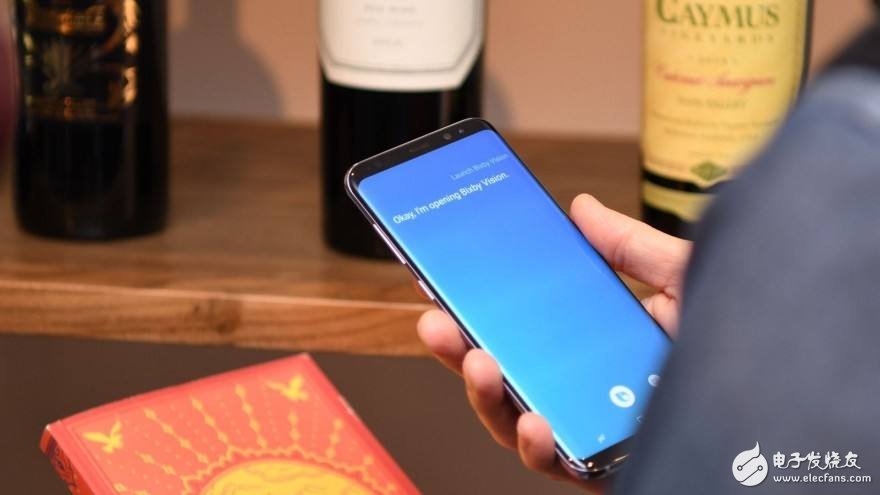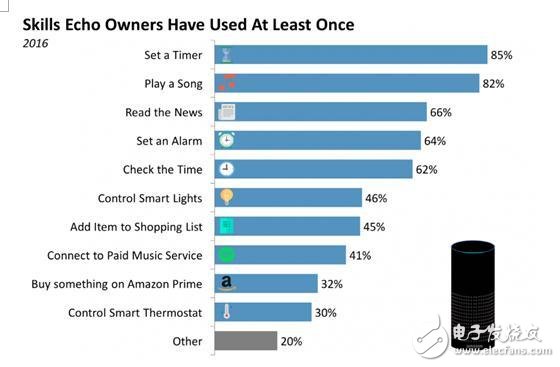Intelligent voice assistant has become one of the hotspots of CES and MWC in 2017. The built-in intelligent voice assistant products cover many fields and multiple brands of products, such as Ford Motor, Whirlpool, LG and other home appliance manufacturers' washing machines, refrigerators, and electric ovens. Such as home appliances, LG home robots and Huawei smartphones, intelligent voice assistants have become the core configuration of many smart products. The Intelligent Voice Assistant presented an accelerated development trend in 2016, which is reflected in the following aspects: Intelligent voice is rapidly developed with smart home as the entry point. Apple released Smart Voice Assistant as early as 2011, but its rapid development is marked by the rapid development of Amazon Alexa in 2016. First, sales have grown rapidly. Amazon's built-in Alexa voice shopping assistant Echo customer penetration rate has increased from 2% to 5%, as of the end of 2016, Amazon sold a total of 6 million Amazon Echo devices [1]. Second, the intelligent voice assistant function is rapidly improved. Alexa had only 13 built-in skills when it was first released in 2014. It is now compatible with 7000 apps, including Uber, Twitter and other applications. Users can use Echo's voice recognition function to control any networked device such as lights, TV, air conditioner and more. The third is the rapid expansion of ecology. In December 2015, Intel and Amazon announced that they will cooperate on a series of smart home projects in the future and plan to develop an intelligent voice architecture using Intel chips and Amazon Alexa virtual assistants. Automaker Ford also announced cooperation with Amazon at this CES. In the future, car owners will be able to experience Alexa voice service on Ford vehicles, realize voice-activated shopping, search navigation, and even start the engine, lock or unlock the voice command at home. Car door. Many companies such as LG and GE have reached an agreement with Amazon to embed Alexa in their products. Deep learning algorithms to help improve speech recognition technology is the main reason for the rapid development of intelligent voice assistants. In the past two years, the deep learning algorithm has been rapidly developed, and its results have been first applied in the field of speech recognition and promoted its breakthrough progress. In 2016, MIT Technology Review combines speech recognition with natural language understanding and rated it as one of the top 10 breakthrough technologies in 2016. The convolutional neural network level (CNN) of the deep learning algorithm applied to speech recognition, from the initial 8 layers, to the 19th, 22nd, and even 152 layers of network structure, and with the deepening of the network structure, the speech recognition error The rate has also gradually decreased from 16.4% in 2012 to 3.57% [2]. Many companies' speech recognition systems have a speech recognition accuracy rate of more than 90%, which has surpassed humans in many occasions. Voice will become one of the mainstream ways of human-computer interaction. Voice interaction frees people's hands from the touch screen, reducing the amount of time people spend on data entry. However, voice interaction is not suitable for all scenarios. For example, it is impolite to talk to a mobile phone in a public place. At this time, interaction through the screen may be more convenient than voice. Devices that are more suitable for voice applications include home and car, which is one of the reasons why Amazon Alexa is growing faster than Apple Siri. The current variety of intelligent voice interaction assistants is just the prototype of Virtual Personal Assistant (VPA). VPA will have a complete personal assistant function, which will become the node of user connection service and provide ubiquitous service. VPA will interact with many third-party app programs. Users can tell VPA when they need a certain kind of service. VPA can search and decide which app to call for service. The app will move from desktop to background and become a sub-service of VPA; VPA It also has the ability to learn, grasp the user's preferences and habits according to historical data, pre-judge the user's needs, and provide continuously optimized services that meet the user's personality characteristics. The giants have all entered the market and competed for a new entry for intelligent voice interaction. Apple is a pioneer in the development of intelligent voice assistants. In 2011, the smart voice assistant product Siri was built into the iPhone. In 2012, Google released a smart voice product called Google now, and in 2016 launched the evolution product Google Assistant. In 2014, Amazon introduced the wireless speaker product of Alexa, a built-in voice assistant. Microsoft released Smart Voice Assistant relatively late, and its smart voice assistant product, Cortana, was released in 2015 along with the new Windows 10 operating system. Facebook launched the Smart Voice Assistant Service M in 2015, built-in AI technology, and has a human team support. Baidu also released a smart voice assistant product called Duer in 2015. Samsung acquired Viv, a smart voice assistant technology company, in 2016 and plans to launch related products in 2017. These vendors all have a dominant ecosystem, such as e-commerce, search engines, and smartphones, all of which provide a wealth of data to support these specific platforms of intelligent voice assistants. A lot of data for "learning" makes AI more efficient, making recommendations and positioning more nuanced. Amazon is temporarily leading the development, and there are variables in the future competitive landscape. Amazon's Alexa is ahead of Apple and Google in terms of sales, features, and ecology. However, the device is still the key to the success of the intelligent voice assistant. The intelligent voice assistant needs to have a large enough device platform as the distribution interface to provide anytime, anywhere, ubiquitous service, and the mobile phone that is carried around is an ideal hardware carrier. Apple and Google have succeeded in the field of smart phones, and may come to the forefront in the future. The giants launched an ecological layout around the intelligent voice assistant to promote cross-platform and cross-system intelligent voice assistant applications. Vendors expand their ecological construction through open APIs and interactions with third-party apps, and promote voice assistants in mobile phones, homes, and automobiles. Amazon takes the open Alexa voice technology for free use by third-party developers. In addition, Amazon does not set up an exclusive cooperation agreement with partners, hardware manufacturers can freely switch to competitors' voice assistants, which also makes hardware manufacturers more willing to integrate Alexa. Apple released its own smart home platform HomeKit as early as 2014, and continued to strengthen the integration of HomeKit and Siri; in June 2016, Apple announced the opening of the SDK to developers, allowing other third-party applications to access Siri. Google also said it will open the sponsor to developers and third-party software and hardware. The current intelligent voice assistant business model is diversified. The current mature business model of Amazon. Amazon's core retail business is built into Echo, and user interaction with Echo encourages users to shop more, and more data is fed back to Amazon's recommendation system, so websites and apps can once again drive users to buy more. Many goods. The other is to use the intelligent voice assistant to achieve a deeper understanding of the user and achieve more accurate user positioning. The Smart Voice Assistant has a detailed data set of user needs, combined with knowledge of physical trajectories, search history, and e-mail and text content to achieve better ad targeting. Companies such as Google and Facebook are currently adopting this revenue model. Usage habits still need to be cultivated According to Gartner's survey data, users often use two or three features of the Smart Voice Assistant—weather, location, and calendar check. Although Echo has thousands of functions, most of its features are not used by users. The most important function of users using Amazon Echo is to set the time and play songs, and more than 80% of users have used [3]. Market fragmentation At present, there are a number of vendors in the market that provide intelligent voice assistant services. These vendors have reached cooperation with different equipment manufacturers to form their own ecosystem. Equipment vendors with built-in smart voice assistants must be open to existing alternatives and work with different service providers to provide user-friendly, cross-platform services. Private issues Ideally, personal authentication information should be securely stored on the user's device and not leaked to the smart voice assistant provider or other service provider. However, in fact, the intelligent voice assistant needs to upload the user data to the cloud server, and after calculation, the result is returned to the terminal, which involves the cloud storage security issue. Technical bottleneck Intelligent voice assistants also have problems with semantic understanding. Although speech recognition technology has made great progress in the past two years, understanding the environment and contextual semantics of the entire dialogue is the bottleneck of most machine learning or artificial intelligence. It is difficult for machines to express the meaning and context of words. Combine. On the one hand, speech recognition technology is synchronized with foreign development. Keda Xunfei has won ten consecutive championships in the Blizzard Challenge of the world's highest level speech synthesis competition. In 14 and 15 years, the international Chinese-English translation contest IWSLT has won the NIST international evaluation champion in the world's first and 15-year machine oral translation system. The success rate of interaction is more than 86%, and the second place is up to 10% [4]. On the other hand, local intelligent voice assistants have a competitive advantage over foreign products. Baidu is the only one operating a smart voice assistant among companies of the same size except for US companies. Baidu intelligent voice assistant Duer can provide search services, scheduled movie tickets, taxis and other assistant services, using end-to-end deep learning system, sometimes it is more accurate than human identification in identifying Chinese speech segments. The large domestic population and strong Chinese content database are the competitive advantages of Duer. Compared with Microsoft Cortana, Baidu's search engine database has advantages, and Google has not been used in China so far, making Duer the most driven by the Chinese market. voice assistant. Duer is built into the Baidu Android search app and installed on millions of mobile phones in China. Baidu is working to extend Duer to other devices beyond mobile phones, such as robots or home devices. Prototype Printed Circuit Board,Multilayer Flex Pcb,Pcb Control Board,Fpc Circuit Board Assembly Dongguan Jingling Communication Technology Co., Ltd. , https://www.wsdpcba.com

Intelligent voice assistant will become the entrance of smart home users
First, intelligent voice assistant accelerates development of technology drive is the main cause